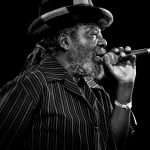Vybz Kartel
Dynamic Life of Vybz Kartel: Reggae’s Controversial Icon
Introduction
Vybz Kartel, a name that resonates powerfully within the world of reggae and dancehall music, is synonymous with both innovation and controversy. Born as Adidja Azim Palmer on January 7, 1976, in the Waterford district of Jamaica, Vybz Kartel has carved a niche for himself as a prolific artist whose music transcends boundaries. Known for his coarse-grained yet melodic style, Kartel has captivated audiences across the globe, from the pulsating streets of Jamaica to the vibrant dancefloors of international clubs. Despite facing legal battles and serving time, his influence and reach remain undiminished. This biography delves into the life and career of this extraordinary artist.
Early Life and Musical Beginnings
Adidja Palmer, better known as Vybz Kartel, was born into a world rich with the rhythms and sounds of reggae. From a young age, he was drawn to music, influenced by the vibrant culture surrounding him. His first foray into the music scene came as a teenager. It began with the release of his single “Love Fat Woman” under the moniker Adi Banton. This marked the beginning of a journey that would see him become a household name in reggae music.
Formation of Vibes Cartel
In 1996, Kartel formed a group known as Vibes Cartel with friends Mr. Lee and Escobar. Despite its short-lived existence, the group served as a stepping stone for Kartel. He retained the name in an altered form as he embarked on his solo career. His talent soon caught the attention of Bounty Killer, a prominent dancehall figure, who took him under his wing. Writing for Bounty Killer and other artists in the Alliance management roster, Kartel honed his skills and prepared for his breakthrough.
Vybz Kartel Rise to Fame
Vybz Kartel’s rise to fame began in earnest in 2002 with a series of solo hits like “Guns Like Mine,” “Badman,” and “Most High.” His collaborations with reggae singer Wayne Marshall also contributed to his growing reputation. The crowning moment came when he was named the 2002 Deejay of the Year at the Stone Love Sound System’s 30th anniversary party—a prestigious accolade within the Jamaican dancehall community.
Breakthrough with “Up 2 Di Time”
In 2003, Kartel released his debut album, Up 2 Di Time, which received critical acclaim and solidified his status as a leading figure in the dancehall scene. However, it was not just his music that captured headlines. His on-stage clash with Ninjaman during the Sting festival in Portmore became a widely discussed event. This highlighted the intense rivalries within the dancehall culture. Despite the physical altercations and subsequent arrests, Kartel’s public apology and truce with Ninjaman demonstrated his commitment to the music over conflict.
International Collaborations and Controversies
As Kartel’s career progressed, he began to make waves internationally. Collaborations with artists like Rihanna, Missy Elliott, and Major Lazer expanded his reach. Notably, his feature on Major Lazer’s “Pon de Floor” introduced him to new audiences and showcased his versatility.
Diss Tracks and Rivalries
Kartel’s career has not been without its controversies. His falling out with Bounty Killer led to a series of diss tracks and public feuds, most notably with Beenie Man. These rivalries polarized fans, creating factions known as Gaza (Kartel’s supporters) and Gully (Mavado’s supporters). The tension even escalated to gang violence, prompting intervention from Jamaican Prime Minister Bruce Golding.
Legal Battles and Incarceration
In September 2011, Vybz Kartel’s career took a dramatic turn when he was arrested and charged with the murder of Barrington “Bosie” Burton. Though he made bail, additional charges in connection with the murder of Clive “Lizard” Williams kept him behind bars. In 2014, Kartel was sentenced to life imprisonment, a verdict that shocked fans worldwide.
Music Behind Bars
Despite his incarceration, Vybz Kartel continued to release music. His 2016 album King of the Dancehall reached number two on Billboard’s reggae chart. This success was propelled by the single “Fever.” Albums such as To Tanesha and Of Dons & Divas followed, proving that Kartel’s creative spirit remained undeterred.
Recent Developments
In March 2024, Kartel’s murder conviction was overturned, a decision celebrated by his fans and supporters. He marked his release with the mixtape First Week Out, a collection of previously unreleased tracks. As he steps back into the world, the future of Vybz Kartel promises to be as dynamic and influential as his past.
Legacy and Impact
Vybz Kartel’s contribution to reggae and dancehall music is undeniable. His ability to blend traditional reggae with contemporary sounds has earned him a place among the genre’s greats. Despite personal and professional challenges, his music continues to inspire and resonate with audiences worldwide. As Vybz Kartel reclaims his place in the music industry, his legacy as a pioneering artist remains firmly intact.












